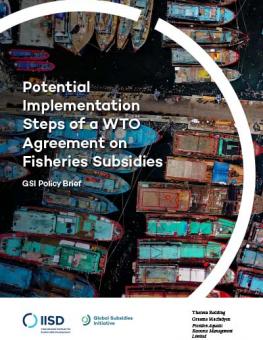
Potential Implementation Steps of a WTO Agreement on Fisheries Subsidies
As members of the WTO negotiate new rules to curb harmful fisheries subsidies, this policy brief examines the potential steps governments could take to implement successful subsidy reform that promotes more sustainable fisheries.
Key Messages
- WTO members negotiating new multilateral disciplines to curb harmful fisheries subsidies should begin preparing for the reform of these support measures. In many cases, such reform would be useful in supporting more sustainable fisheries irrespective of whether an agreement is reached at the WTO.
- There are various practical steps that WTO members could consider to implement fisheries subsidy reform. While some of these steps are general, including establishing a subsidy inventory and crafting a subsidy reform program, others are more focused on the specific rules currently negotiated at the WTO.
- This may be an opportune time for donors and technical assistance providers to assess whether and how existing programs can be leveraged to assist developing countries with reforming fisheries subsidies.
Members of the WTO are negotiating new rules on fisheries subsidies with the aim of concluding a multilateral agreement on this issue by the end of 2020. However, there is currently very little guidance available about the reform of fisheries subsidies, either in the context of a possible WTO agreement or to guide unilateral reform.
This policy brief sets out some early thinking about the possible implementation of new WTO subsidy rules. It starts by presenting general implementation steps WTO members could take to fulfill their obligations for subsidy reform under agreed disciplines, irrespective of any specific rules. It then describes some of the more concrete steps that might be required to implement particular disciplines in the three main substantive areas under discussion at the WTO—i.e., subsidies that contribute to (1) illegal, unreported, and unregulated fishing, (2) the fishing of overfished stocks, and (3) overcapacity and overfishing more broadly. Finally, the brief shortly discusses the role of technical assistance in helping developing WTO members to successfully reform their fisheries subsidies, including through a potential change in the focus of existing assistance programs.
.
You might also be interested in
Source to Sea: Integrating the water agenda in 2023
2023 could prove to be a definitive year for facilitating an integrative perspective on water issues, from fresh water to the marine environment.
S'pore becomes 2nd country to support global agreement ending harmful fisheries subsidies
Singapore has become the second member of the World Trade Organisation (WTO) to ratify its agreement to protect the world’s oceans. On Friday, the Republic formally accepted the treaty – the first multilateral trade agreement that focuses on environmental sustainability – becoming the first coastal state to do so.
Five Key Priorities to End Fossil Fuel Subsidies in Canada
As the G7 president in 2025, Canada has a pivotal opportunity to lead by fully phasing out fossil fuel supports and investing in a cleaner, more equitable future. Here are five recommendations for effective subsidy reform.
The Cost of Fossil Fuel Reliance
Government support for fossil fuels reached at least USD 1.5 trillion in 2023, new data shows.